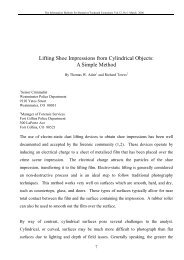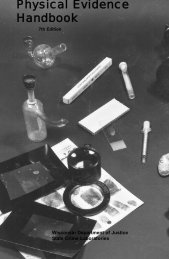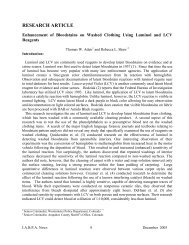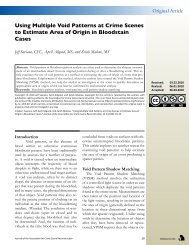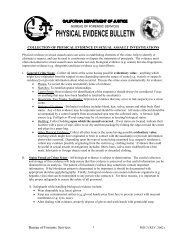A Guide for Explosion and Bombing Scene Investigation
A Guide for Explosion and Bombing Scene Investigation
A Guide for Explosion and Bombing Scene Investigation
You also want an ePaper? Increase the reach of your titles
YUMPU automatically turns print PDFs into web optimized ePapers that Google loves.
About the National Institute of Justice<br />
The National Institute of Justice (NIJ), a component of the Office of Justice Programs, is the<br />
research agency of the U.S. Department of Justice. Created by the Omnibus Crime Control<br />
<strong>and</strong> Safe Streets Act of 1968, as amended, NIJ is authorized to support research, evaluation,<br />
<strong>and</strong> demonstration programs, development of technology, <strong>and</strong> both national <strong>and</strong> international<br />
in<strong>for</strong>mation dissemination. Specific m<strong>and</strong>ates of the Act direct NIJ to:<br />
• Sponsor special projects <strong>and</strong> research <strong>and</strong> development programs that will improve <strong>and</strong><br />
strengthen the criminal justice system <strong>and</strong> reduce or prevent crime.<br />
• Conduct national demonstration projects that employ innovative or promising<br />
approaches <strong>for</strong> improving criminal justice.<br />
• Develop new technologies to fight crime <strong>and</strong> improve criminal justice.<br />
• Evaluate the effectiveness of criminal justice programs <strong>and</strong> identify programs that<br />
promise to be successful if continued or repeated.<br />
• Recommend actions that can be taken by Federal, State, <strong>and</strong> local governments as well<br />
as by private organizations to improve criminal justice.<br />
• Carry out research on criminal behavior.<br />
• Develop new methods of crime prevention <strong>and</strong> reduction of crime <strong>and</strong> delinquency.<br />
In recent years, NIJ has greatly exp<strong>and</strong>ed its initiatives, the result of the Violent Crime<br />
Control <strong>and</strong> Law En<strong>for</strong>cement Act of 1994 (the Crime Act), partnerships with other Federal<br />
agencies <strong>and</strong> private foundations, advances in technology, <strong>and</strong> a new international focus.<br />
Examples of these new initiatives include:<br />
• Exploring key issues in community policing, violence against women, violence within<br />
the family, sentencing re<strong>for</strong>ms, <strong>and</strong> specialized courts such as drug courts.<br />
• Developing dual-use technologies to support national defense <strong>and</strong> local law en<strong>for</strong>cement<br />
needs.<br />
• Establishing four regional National Law En<strong>for</strong>cement <strong>and</strong> Corrections Technology<br />
Centers <strong>and</strong> a Border Research <strong>and</strong> Technology Center.<br />
• Strengthening NIJ’s links with the international community through participation in the<br />
United Nations network of criminological institutes, the U.N. Criminal Justice In<strong>for</strong>mation<br />
Network, <strong>and</strong> the NIJ International Center.<br />
• Improving the online capability of NIJ’s criminal justice in<strong>for</strong>mation clearinghouse.<br />
• Establishing the ADAM (Arrestee Drug Abuse Monitoring) program—<strong>for</strong>merly the Drug<br />
Use Forecasting (DUF) program—to increase the number of drug-testing sites <strong>and</strong> study<br />
drug-related crime.<br />
The Institute Director establishes the Institute’s objectives, guided by the priorities of the<br />
Office of Justice Programs, the Department of Justice, <strong>and</strong> the needs of the criminal justice<br />
field. The Institute actively solicits the views of criminal justice professionals <strong>and</strong> researchers<br />
in the continuing search <strong>for</strong> answers that in<strong>for</strong>m public policymaking in crime <strong>and</strong><br />
justice.<br />
To find out more about the National Institute of Justice,<br />
please contact:<br />
National Criminal Justice Reference Service,<br />
P.O. Box 6000<br />
Rockville, MD 20849–6000<br />
800–851–3420<br />
e-mail: askncjrs@ncjrs.org<br />
To obtain an electronic version of this document, access the NIJ Web site<br />
(http://www.ojp.usdoj.gov/nij/pubs-sum/181869.htm).<br />
If you have questions, call or e-mail NCJRS.




